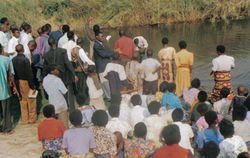William Branham's Teachings on Water Baptism
 Believers of William Branham's message often challenge those outside of the message to "find one scripture in the Bible in which anyone was ever baptized in the name of the Father, Son and Holy Spirit." People in the message are taught that the only true form of Christian baptism is in the triune name of the Lord Jesus Christ. This is an highly important issue for message believers and we are aware of at least one instance where a deacon baptized an individual in the name of the Lord Jesus and was required to baptize the person again in the name of the Lord Jesus Christ. An Invitation to Prove William Branham WrongThe Challenge from William BranhamHEBREWS.CHAPTER.TWO.2 JEFF.IN HEB 57-0825E
So there is the challenge laid down by William Branham - Find one scripture where any person was ever baptized any other way than in the Name of the Lord Jesus Christ. Actually that challenge is quite easy to meet and we would challenge message believers to find us one scripture where anyone was actually baptized in the name of the Lord Jesus Christ. The Bible should be simply understood and therefore it seems quite obvious that William Branham has interpreted the scripture to say something that it clearly doesn't. The phrase "Lord Jesus Christ" appears 6 times in the book of Acts so it would have been very easy for Luke to have stated clearly that people were to be baptized in the name of the Lord Jesus Christ. But since he didn't, it is not possible to make that claim. Scriptures referring to how baptism was conducted in the New TestamentActs 2:38
Acts 8:16
Acts 10:48
Acts 19:5
Romans 6:3
Galatians 3:27
So we have certainly found multiple scriptures that show people begin baptized in a form other than the three-part Name of the Lord Jesus Christ. It is clear from the Bible that there did not appear to be an emphasis on the exact formula of baptism, thereby proving one of the fundamental doctrines of William Branham's message to be flawed. Another Challenge from William BranhamTHE.REVELATION.OF.JESUS.CHRIST JEFF.IN 60-1204M
William Branham's reference to the Nicene Council is to The First Council of Nicaea. which was a council of Christian bishops convened in Nicaea in Bithynia (present-day İznik in Turkey) by the Roman Emperor Constantine I in AD 325. However, William Branham's assertion that no one was baptized in the name of "Father, Son, Holy Ghost" is historically incorrect. While it appears clear that the very earliest forms of water baptism in the Book of Acts do not reference the trinitarian formula, it is also clear that the use of the trinitarian baptismal formula does predate the First Council of Nicea by at least a hundred years or more. The DidacheThe Didache or The Teaching of the Twelve Apostles (Didachē means "Teaching") is a brief early Christian treatise, dated by most scholars to the late first or early 2nd century.[1] Some even date it as contemporary with the books of the New Testament (c. A.D.40-60).[2] However, because of references in literature from the early 4th century, no scholars date the Didache as later than the 3rd century. With respect to water baptism, the Didache states:
Church FathersHippolytus"When the one being baptized goes down into the water, the one baptizing him shall put his hand on him and speak thus: ‘Do you believe in God, the Father Almighty?’ And he that is being baptized shall say: ‘I believe.’ Then, having his hand imposed upon the head of the one to be baptized, he shall baptize him once. Then he shall say: ‘Do you believe in Christ Jesus . . . ?’ And when he says: ‘I believe,’ he is baptized again. Again shall he say: ‘Do you believe in the Holy Spirit and the holy Church and the resurrection of the flesh?’ The one being baptized then says: ‘I believe.’ And so he is baptized a third time" (The Apostolic Tradition 21 - A.D. 215). Tertullian"After his resurrection he promises in a pledge to his disciples that he will send them the promise of his Father; and lastly, he commands them to baptize into the Father and the Son and the Holy Ghost, not into a unipersonal God. And indeed it is not once only, but three times, that we are immersed into the three persons, at each several mention of their names" (Against Praxeas 26 - A.D. 216). Origen"The Lord himself told his disciples that they should baptize all peoples in the name of the Father and of the Son and of the Holy Spirit . . . for indeed, legitimate baptism is had only in the name of the Trinity" (Commentary on Romans 5:8 - A.D. 248).
Footnotes |